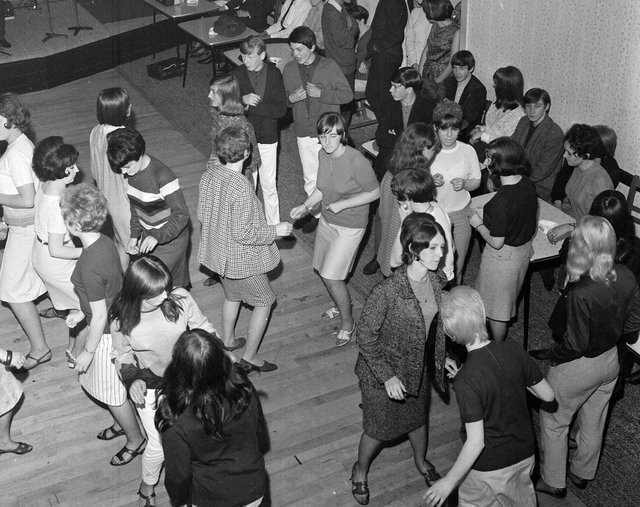The Gorbals… “Awful!” – housing tenements which showed the carelessness of capitalism towards the working class. Whilst bourgeois nationalists fetishise the conditions of the Gorbals and schemes like it to suit their agenda of exceptionalism, the reality was farfetched from their portrayal of excellence – poor conditions, colossal poverty, disease, and death. The working class in districts like theses had nothing, and what they had they saved. No bathroom, no supply of hot water, and sewage, festering then erupting onto the overcrowded backcourts where children played. The workplace was no pretty site either. Long hours, unforgiving labour, and unlawful working conditions saw the working class of Glasgow, and indeed the whole of Scotland beaten to the ground. Despite this, the working class still kept its spirit. This spirit was bright, extravagant, spectacular, the bees-knees, lively, rebellious, and one of its own. This was the spirit of the dance halls.
Glasgow had dozens of dance halls in the 1920s – more than any place else in all of Britain. The tradition of dance halls remained strong across Scotland for decades. During the 1940s and 1950s, venues such as the Plaza, the Barrowlands, and Green’s Playhouse were at the peak of their powers. These venues provided a safe, fun, social, and loving environment, created by the workers of Scotland.
The routine and preparations for attending a night at the dancing were simple. Finish work, go home, doll up, assemble the team, grab a carry out, head to the dancing, and enjoy the night. This ritual is what kept the resolve of the working class strong during 1914, and late into the 1960’s. Working-class men and women, spending a night of socially-driven fun – a distraction from the exploitation that they would endure in their day to day lives. It was extraordinary that this tradition was continuously kept alive throughout wars, political unrest, mass poverty, and brutal living standards. There were middle-class dancehalls in Scotland, but there was no dancehall like the working-class dancehall. It was kept alive and flourished by the working class, who had continuously survived attempts by the government to break their spirit by destroying communities and leaving workers to fester in the slums. The workers refused to let this dampen their spirit.
The rebellious attitude of the workers was shown in every aspect of the dancing tradition, with attendees dressing up in spectacular fashion. The men dawned sharp suits with shining shoes, eager to show a character that they didn’t often show during the working hours. The women displayed extraordinary dresses and hair styles, a stark contrast to the environment and conditions that they suffered in. This was a scene that even drove the middle class to jealousy and hate. Many of them viewing the working-class dancehalls as “vulgar” and “not proper”. These remarks did not faze any of the workers who just wanted to escape that brutality of their working and living conditions and enjoy the dancing.
Fast forward to the current 2020’s, has this vibrant tradition evolved or degraded? The tradition of the dance halls began to slowly dissolve into the 70’s, with the youth finding rock music as the speaker to their souls. As the years went on and music evolved, all types of venues prioritised profit over the wellness, safe being, and enjoyment of the attendees. The most infamous for this was nightclubs. In the 21’st century we’ve seen a terrifying rise in sexual assaults in and across nightlife venues across the whole of the UK. There has also been a drastic incline in drug-based violence. Although such incidents undeniably occurred in the past, these venues are becoming safe and hospitable places for the working class to socialise. The cultural shift has a saw a drastic change from community and social based interaction to a selfish and self-destructive form of social depravity. Venues now cash into the plight of the new social dynamic of the nightclub/dance scene. Ridiculous prices, poor safety protocols, discriminatory entry policies, and aggressive exploitation of venue staff. Venue owners and managers also take no responsibility for fights, thefts, and anti-social behaviours that occur under their eye.
Nightlife isn’t the only form of community based social and cultural expression that has degraded over time. Community halls, football facilities, leisure centres, multi-sports facilities, and libraries have all felt the crippling impact of capitalism and its inherent disregard for the working class, further limiting the financial capacity for workers to participate in healthy and social past times. This then begs the question, what is to be done? Working class people must work in building their local communities, targeting social issues that directly impact them. Building and improving the social lives of our fellow workers is paramount to strengthening the resolve required to effectively combat the destructive capitalist system.
Nathan Hennebry, is a member of the YCL’s Glasgow branch



